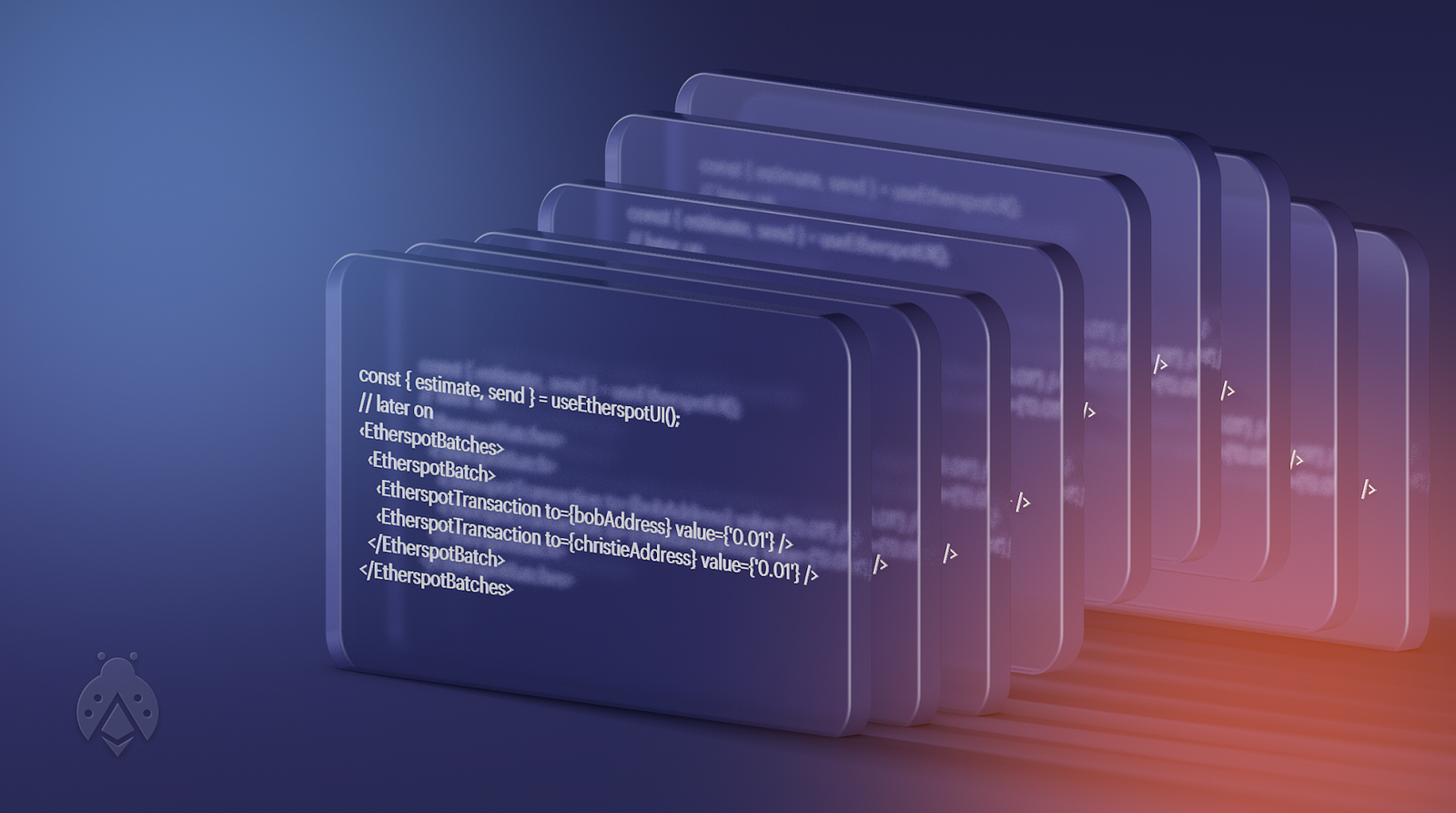Please fasten your belts!
Etherspot rolls out TransactionKit
We want to start our digest with a thrilling announcement. The Etherspot team has launched TransactionKit, a revolutionary development tool for multichain dapps. It is designed to make it easy for front-end developers to build Web3 solutions.
TransactionKit is the first development tool of its kind, offering a range of features that make it accessible and intuitive for developers without blockchain experience.
With its multichain support, gas optimization, smart contract interactions, and easy-to-use interface, everyone can come up with their own application. Read more here.

Ethereum developers agreed on Shanghai hard fork date
Ethereum developers plan to introduce the Shanghai hard fork, also known as “Shapella,” on April 12th. This happened during the All Core Developers Execution Layer #157 call.
The upgrade marks Ethereum’s full transition to a proof-of-stake network and will enable staked ETH withdrawals. The date will be confirmed via GitHub, and once set, slot 6209536 will be locked in for the upgrade.
The upgrade was slightly delayed from the developers’ initial target for this month. While staked ETH withdrawals were processed on the testnet, blocks weren’t finished until roughly 90 minutes after the fork went live.
Despite this, Ethereum developers are not worried, as it is typical for testnet upgrades to have some issues.
Product lead of Teku, an Ethereum client, Ben Edgington, reassured users that losing finality for 90 minutes is annoying but not crucial for most Ethereum apps or users. He added that people are diligent about maintaining their mainnet staking infrastructure, so there is no cause for concern.
Vitalik Discusses Self-Custody of Crypto Assets
Vitalik Buterin discussed on Twitter the significance of multisig and social recovery wallets in securing crypto assets:
Reminder: Multisig wallets use multiple signatures to reduce the risk of loss from a centralized entity, while social recovery enables wallet restoration without seed phrases, maintaining full non-custodial control.
Buterin noted that social recovery wallets make it easier to sign transactions, even if a key is lost, with emerging technologies like ERC-4337 account abstraction and advanced wallet services.
He recommends using social recovery for hot wallets that store a small portion of funds and multisigs for cold wallets that store large savings.
Novel Web3 solutions by university students
As we mentioned in our previous newsletter, ETHDenver is already closed, and the results are summed up. However, only several sources highlighted the participation of university students in the conference.
The Stanford “0xPass” team demonstrated how account abstraction could eventually enable Web3 wallets to be managed by smart contract code, eliminating the need for wallet owners to approve each transaction.
Modulus Labs’ Stanford team spoke about zero-knowledge approaches to verify AI models, which could enable cryptographically fair AI decision-making.
Tianzuo Zhang, from Tsinghua University in China, is building a security defender application, “HoneyDApp,” to mitigate the damage that decentralized applications could face from various security threats.
Polkadot will launch its third iteration of the “Polkadot Blockchain Academy” with the University of California, Berkeley, from July 10 through August 10, 2023. They plan to educate and support the next generation of blockchain engineers and developers.

Decentralized Identity — the pillar of Web3
Blockworks has introduced a new framework for Web3.
Publisher asserts Web2 identity lacks inherent sovereignty. It is fundamentally broken due to third-party gatekeepers such as social media apps, email platforms, and games controlling how and where users express their identities. This results in a fragmented network, requiring users to share more personal information upfront, curate multiple social profiles, and limit personal development.
Decentralized identity aims to give users sovereignty over how their identity is expressed online, enabling a management system that doesn’t require traditional gatekeepers. Instead, platforms request user permission, enabling use cases that open the door to a new digital identity economy.
However, there are multiple methods with varying trade-offs, and developments in account abstraction and identity wallets may produce a solution that allows users to manage every part of their online expression in one place.
Using a pseudonymous profile in an identity wallet, users could apply for remote contract work or vote on a governance proposal. Verifiable credentials can revolutionize reputation and help foster an ecosystem that rewards people more for their contributions than their influence.

However, risks include accidentally making sensitive information permanently public on the blockchain and carrying mistakes into interactions. The decentralized identity ecosystem must balance flexibility with accountability to earn user confidence. Lending DAOs, for example, need guarantees that loan applicants aren’t hiding negative reputation claims.
The decentralized identity framework aims to give users back control of their identity online, but some more work must be done to overcome challenges and earn user confidence.
Ethereum contract check by ChatGPT-4
Conor Rogan, Coinbase director, asked GPT-4 to review an active Ethereum contract.
The machine instantly identified several security vulnerabilities and pointed out areas where the contract could be improved. Then it checked how one could exploit the contract.
Rogan also noted that this contract was hacked in 2018 via the vulnerabilities that ChatGPT pointed out.
Smart Contract Wallets Beginners Guide by BlockWorks
Another move from Blockworks we can’t ignore is their fresh guide about smart contract wallets.
This guide provides an overview of smart contract wallets and the ERC-4337 account abstraction approach launched by the Ethereum Foundation.
The paper explains the Ethereum account model and how externally owned accounts (EOAs) and smart contract accounts differ. It highlights the limitations of the standard EOA model and how smart contract wallets offer a choose-your-own-adventure approach to self-custody.
Readers learn that smart contract wallets enable bundled transactions, customizable recovery options, gas fee payment in different tokens, greater privacy in identity management, and more.
It also covers many other potential benefits and risks of smart contract wallets.
Share the AA digest with your friends & colleagues!
Subscribe to our newsletter and get the latest updates on AA
- Learn more about account abstraction here.
- Head to our docs and read all about the Etherspot SDK.
- For a plug & play integration, review the BUIDLer react component.
- Follow us on Twitter and join our Discord.
❓Is your dApp ready for Account Abstraction? Check it out here: https://eip1271.io/
Get In Touch:
Website | Twitter | Discord | Github | Telegram
Powered by Etherspot
BUIDLer React Component | TransactionKit | Etherspot Dashboard | Pillar Wallet | AirdropMe

